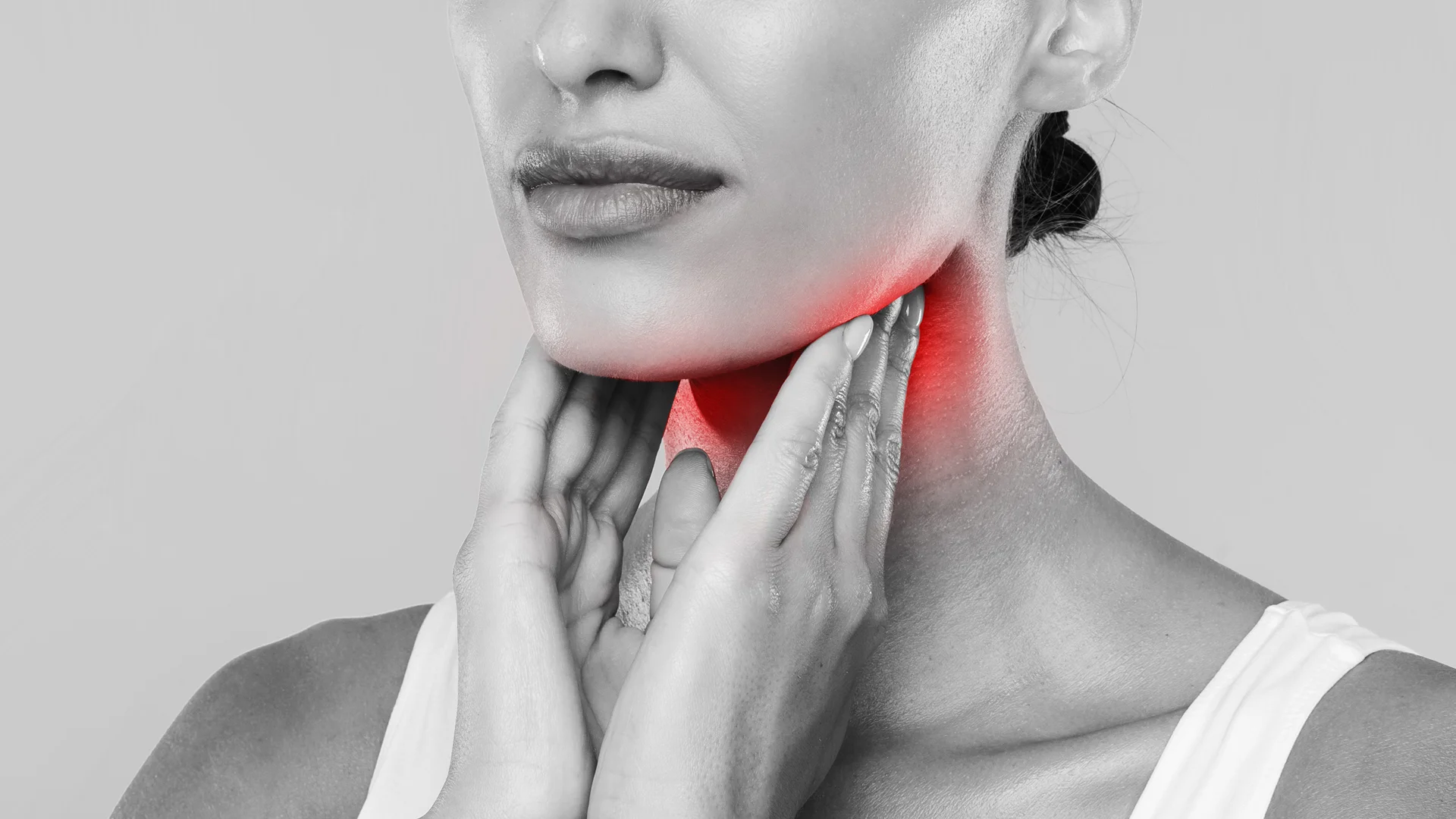The Thyroid Mystery: Why Does Your Neck Hurt
At Kaly, we know that neck pain can be disruptive and concerning. That’s why we want to provide you with helpful information if your neck pain may be related to a thyroid condition.
Keep reading to learn more about the thyroid gland, thyroid disorders that can cause neck pain, key symptoms to look out for, and how we can connect you with the right thyroid care.
Thyroid Gland Explained
The thyroid gland is a small, butterfly-shaped gland located at the base of the front of your neck. It has two side lobes, connected by a bridge, giving it a bow tie appearance.
The thyroid gland produces thyroid hormones that regulate your metabolism, heart rate, body temperature, and calcium levels.
Thyroid disorders occur when the thyroid produces too much hormone (hyperthyroidism) or not enough (hypothyroidism). An imbalance in thyroid hormones can cause wide-ranging symptoms, and neck pain or discomfort is one possible symptom.
Where is the pain located with thyroid neck pain?
Pain from thyroid issues usually centers in the lower front of the neck over the thyroid gland. But it can radiate up into the jaw, ears, and base of the head. Pain might be felt more on the right or left side where the thyroid lobes are.
What does thyroid neck pain feel like?
People often describe thyroid neck pain as a dull achiness, stiffness, tightness, or soreness in the neck area. The pain may worsen when moving the neck or swallowing. Thyroid inflammation can also sometimes cause sharp pains.
Thyroid Disorders That May Cause Neck Pain

There are several thyroid conditions that can potentially lead to neck pain or discomfort:
Hypothyroidism
With hypothyroidism, the thyroid gland does not make enough thyroid hormone. Common causes are Hashimoto’s disease, thyroiditis, radiation treatment, and thyroid surgery. Neck pain from hypothyroidism may feel like stiffness, tightness, or difficulty moving the neck from side to side.
Hyperthyroidism
Hyperthyroidism is when the thyroid is overactive and produces too much thyroid hormone. Graves’ disease is the most common cause. The excess hormones can cause inflammation and swelling that presses on local structures, leading to neck pain or soreness.
Goiter
A goiter refers to an enlarged thyroid gland. It may develop from iodine deficiency, Hashimoto’s disease, or Graves’ disease. As the thyroid grows in size, it can create pressure and discomfort in the neck area.
Thyroid Nodules
Thyroid nodules are lumps that form within the thyroid. While often benign, some may be cancerous. Large nodules can irritate the thyroid tissue and surrounding muscles, potentially causing neck pain.
Thyroid Cancer
In rare cases, persistent neck pain may be a sign of thyroid cancer. Tumors can invade and damage thyroid tissues and compress nerves and muscles, leading to neck pain or stiffness.
Key Signs and Symptoms of Thyroid Neck Pain
How can you tell if your neck pain may be related to a thyroid problem? Be on the lookout for these key signs and symptoms:
- Location – Thyroid neck pain often centers around the front of the neck and base of the throat where the thyroid gland sits. However, it can radiate up into the jaw, ears, and back of the head.
- Swelling or fullness – Look for visual signs of swelling, fullness, or enlargement around the lower front of the neck. This may indicate an enlarged thyroid gland or nodules.
- Pain with swallowing – Discomfort or pain when swallowing can signal thyroid changes putting pressure on the esophagus.
- Hoarse voice – Inflammation pressing on the windpipe and vocal cords may cause voice hoarseness.
- Difficulty moving neck – Stiffness and reduced range of motion, especially tilting the head back, can accompany thyroid neck pain.
- Persistent pain – Thyroid-related neck pain typically lasts for weeks unless the underlying cause is treated.
- Other thyroid symptoms – Fatigue, weight changes, hair loss, and mood changes may also indicate a thyroid disorder.
Getting Evaluated for Thyroid Neck Pain
Because neck pain has many possible causes, getting an accurate diagnosis is key. At Kaly, we make it easy to connect with top specialists who can evaluate your symptoms and order the right thyroid tests, which may include:
- Physical exam – Feeling for thyroid enlargement, swelling, or nodules that could potentially cause neck pain.
- Blood tests – Measuring TSH and thyroid hormone levels to check for hypothyroidism or hyperthyroidism.
- Thyroid ultrasound – Using sound waves to create images of the thyroid and identify abnormalities.
- Thyroid biopsy – Extracting a sample of thyroid cells to test for cancer if nodules are detected.
- Thyroid antibody test – Checking for thyroid antibodies present in autoimmune diseases like Hashimoto’s.
Treating the Cause of Thyroid Neck Pain
The treatment for thyroid-related neck pain focuses on addressing the underlying thyroid disorder causing inflammation or structural changes. This may include:
Hypothyroidism – Thyroid hormone replacement medication to restore normal hormone levels. Levothyroxine is typically the medication prescribed.
Hyperthyroidism – Antithyroid medication, radioactive iodine, or thyroid surgery to reduce excessive hormone production.
Goiter – Radioactive iodine or surgery to shrink thyroid enlargement when severe.
Thyroid nodules – Repeated monitoring, thyroid hormone treatment, or surgery if they continue to grow larger.
Thyroid cancer – Surgery, radioactive iodine therapy, radiation, chemotherapy, or targeted drug therapy.
Hashimoto’s / Graves’ disease – Medication to regulate the autoimmune attack on the thyroid.
Relieving pressure on the thyroid and restoring normal thyroid function can help alleviate inflammation and discomfort. We’ll connect you with top-rated endocrinologists to develop an individualized treatment plan.
Finding Neck Pain Relief

In addition to treating the underlying thyroid disorder, we have tips to help relieve thyroid-related neck pain:
- Over-the-counter anti-inflammatories like ibuprofen can ease swelling and discomfort.
- Apply heating pads or ice packs to the sore neck area for pain relief.
- Get gentle neck massages to loosen up muscles.
- Try easy neck stretches and exercises to improve mobility.
- Maintain good posture and neck support while sitting and sleeping.
- Consider physical therapy with neck stretches and strength training.
- Explore alternative approaches like acupuncture that may reduce neck pain.
- Ask your doctor about steroid injections for pain relief if thyroiditis is the cause.
What tests are done to diagnose the cause of thyroid neck pain?
After a physical exam of the neck, doctors may run blood tests to check thyroid hormone levels and thyroid antibodies, order thyroid ultrasound imaging, or do a needle biopsy of the thyroid to determine the cause and guide appropriate treatment.
How can thyroid neck pain be treated?
Treating the underlying thyroid disorder causing inflammation or enlargement that leads to neck pain is the primary treatment approach. This may include thyroid hormone medication, medications to block thyroid hormone production, radioactive iodine, or surgery in some cases.
Supporting Thyroid Health
To help keep your thyroid functioning properly and prevent issues like goiter, nodules, and thyroiditis down the line:
Get enough iodine – Iodine is needed to produce thyroid hormone. Including seafood, eggs, dairy, and iodized salt provides adequate iodine.
Avoid excess iodine – Too much iodine can also disrupt thyroid function. Limit ingesting kelp, supplements with very high iodine levels, or medications like amiodarone.
Manage stress – High stress negatively impacts the thyroid. Try stress-reducing activities like yoga, meditation, or counseling.
Treat underlying conditions – Managing diabetes, anemia, vitamin deficiencies, and other conditions supports thyroid health.
Avoid certain medications – Lithium, interferon-alpha, interleukin-2, and other drugs can affect thyroid function.
Limit thyroid disruptors – Reducing exposure to pollutants, bisphenol A products, and certain chemicals may help.
Following an overall healthy lifestyle helps keep your thyroid in balance and can prevent many thyroid diseases. We’re here to answer your questions and connect you with specialists to evaluate any thyroid changes.
Partnering With Kaly for Your Thyroid Care

At Kaly, we make it easy to get the right thyroid care, right when you need it. Our compassionate healthcare partners are ready to:
- Evaluate your symptoms and risk factors for thyroid disease.
- Order and interpret necessary thyroid function blood tests.
- Perform ultrasound imaging to assess the thyroid gland.
- Conduct thyroid biopsies if any nodules or growths are a concern.
- Provide treatment plans tailored to your specific thyroid condition.
- Offer regular monitoring and follow-ups to keep your thyroid regulated.
- Refer you to endocrinology specialists for coordinated care.
- Address neck pain and discomfort through medication, therapy, or alternative treatments.
- Supply information, resources, and support throughout your thyroid treatment.
Don’t let neck pain or other thyroid symptoms go unchecked. Browse local thyroid specialists on Kaly who can determine if your neck pain stems from a thyroid disorder and create a personalized treatment plan for you. Contact us today to take control of your thyroid health!
Frequently Asked Questions About Thyroid Neck Pain
Thyroid issues like hypothyroidism, hyperthyroidism, and goiter can sometimes cause neck pain and discomfort.
Here are answers to some frequently asked questions about the connection between thyroid disorders and neck pain.
What are the most common causes of neck pain related to the thyroid?
The most frequent thyroid conditions that can cause neck pain are Hashimoto’s disease leading to hypothyroidism, Graves’ disease causing hyperthyroidism, thyroid inflammation from thyroiditis, and enlargement of the thyroid gland called a goiter. Thyroid nodules and cancer are less common causes.
When should I see a doctor for neck pain possibly related to my thyroid?
See your doctor if neck pain persists for over 2 weeks or is accompanied by symptoms like hoarseness, swallowing difficulties, trouble breathing, vocal changes, or thyroid-related symptoms like fatigue and weight changes. Prompt evaluation is important.
What are some home remedies to help relieve thyroid neck pain?
Gentle neck stretches and exercises, heating pads or ice packs on the sore area, over-the-counter anti-inflammatories, neck massages, and maintaining good posture can help relieve thyroid-related neck discomfort at home.
How can I support my thyroid health to avoid neck pain in the future?
Eating a nutritious diet with adequate iodine, managing stress, avoiding thyroid-disrupting chemicals, treating underlying medical conditions, limiting certain medications, and sticking to a healthy lifestyle can keep your thyroid functioning properly.
When should I contact Kaly to help with potential thyroid neck pain?
Contact Kaly anytime you have persistent or severe neck pain along with any signs of throat swelling, hoarseness, difficulty swallowing, vocal changes, or other thyroid symptoms.
We can connect you with top specialists to evaluate and treat your condition.
Don’t live with neck pain. Kaly makes it easy to get your thyroid checked and access leading thyroid doctors in your area. Reach out so we can help diagnose the cause of your neck pain and guide you to appropriate treatment.
